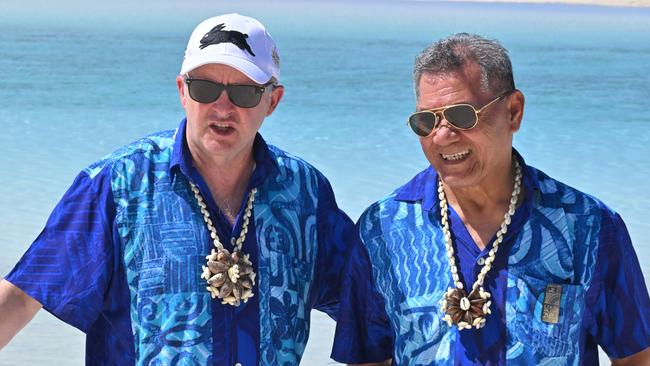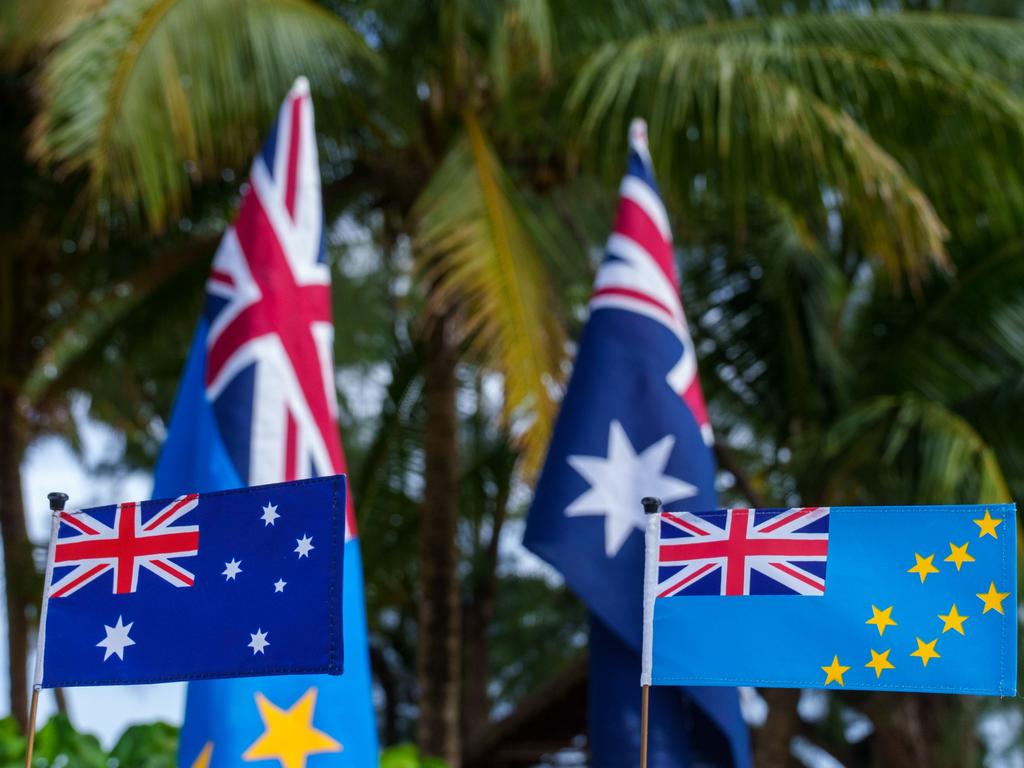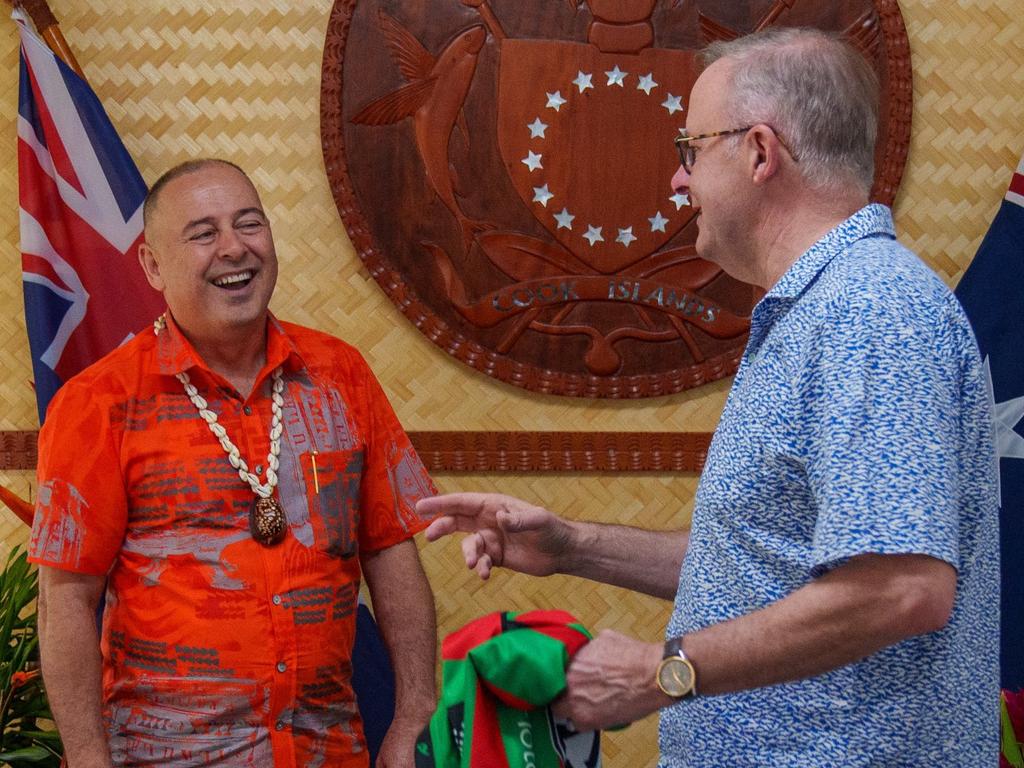A blunt message to China in Anthony Albanese’s Tuvalu deal
Anthony Albanese has signed the ‘most significant’ agreement between Australia and a Pacific nation, which will allow the citizens of Tuvalu to live, work and study in Australia.

Anthony Albanese has signed the “most significant” agreement between Australia and a Pacific nation, with an unprecedented treaty to allow the citizens of Tuvalu – who face increasing threats from climate change – to live, work and study in Australia.
The deal also sends a blunt message to China by including a “mutual agreement” clause which requires Australia’s approval before Tuvalu can sign any security or defence deal with another country.
This would prevent Tuvalu from signing a security agreement in the future similar to the controversial security agreement between the Solomon Islands and China. It may also provide a blueprint for similar arrangements between Australia and Pacific Island nations on security co-operation.
Making the announcement alongside Tuvalu Prime Minister Kausea Natano in Rarotonga at the close of the Pacific Islands Forum leaders’ meeting, the Prime Minister said he was open to other approaches from Pacific nations who wanted to come to a similar arrangement.
Under the “Falepili Union” – Falepili is the Tuvaluan term for neighbours who live in close houses – Australia will come to Tuvalu’s assistance if it experiences a natural disaster, health pandemic or military aggression.
The low-lying Pacific Island nation will have to seek Australia’s agreement before entering into any security co-operation with other countries, such as in telecommunications, ports and infrastructure.
In a move to signal Australia is the Pacific’s partner of choice, up to 280 Tuvalu citizens annually will be able to access a special mobility visa to come to Australia in recognition of the country’s exposure to climate change, remote geography and scarce natural resources.
It was unclear on Friday if the quota would be capped or which Tuvalu citizens would be eligible to access the visa, but Mr Natano vowed to “consider and scrutinise all people who are interested to apply” so the treaty was not taken advantage of.
The Weekend Australian understands Tuvaluans will need to undergo character checks and have good health in order to be able to take up the visa.
Mr Albanese thanked Mr Natano for approaching Australia with its request for the treaty, which The Weekend Australian understands was first presented to the Albanese government in August but had been worked on formally by Tuvalu since last year.
“(This has) led to what is without doubt the most significant agreement between Australia and a Pacific island nation ever,” Mr Albanese said.
“This reflects Tuvalu’s special circumstances as a low-lying nation that’s particularly impacted – it’s very existence – by the threat of climate change. And that’s why we’re assisting on adaptation, but we’re also providing the security that these guarantees represent for the people of Tuvalu who want to preserve their culture, want to preserve their very nation going forward as well. So we’re open to approaches from other countries on how we can enhance our partnerships.”
The treaty says Tuvalu shall provide Australia “rights to access, presence within, and overflight of Tuvalu’s territory, if the activities are necessary for the provision of assistance requested by Tuvalu”, and provided advance notice is given by Australia.
In a key security clause, the treaty states: “Tuvalu shall mutually agree with Australia any partnership, arrangement or engagement with any other state or entity on security and defence-related matters. Such matters include but are not limited to defence, policing, border protection, cyber security and critical infrastructure, including ports, telecommunications and energy infrastructure.
Pacific analyst James Batley said the treaty allowed Australia to assert its leadership in the region and noted that under the agreement Australia would in future play a key role in ensuring the integrity of Tuvalu’s borders, and in its security relationships with third countries.
The former Australian high commissioner to Solomon Islands, Fiji and Tuvalu said there may be scope to expand the treaty and enter into similar arrangements with countries such as Kiribati, which switched allegiance from Taiwan to China in 2019, and Nauru, both of which had small populations and faced similar development challenges.
“It (the treaty) certainly offers something China can’t offer,” Mr Batley said. “I don’t think it’s directed specifically at China but it reminds China, and everybody else, just how multifaceted Australia’s relationships in the Pacific are. It underlines Australia’s role as an indispensable partner.”
Mr Batley said the agreement was genuinely a “really, really big deal – it’s the biggest thing Australia has done in the Pacific for a long time”.
Australian Strategic Policy Institute senior analyst Euan Graham said the treaty represented a potential paradigm shift in microcosm “if it helps persuade other Pacific Island states to consider a similar set of arrangements”.
“This is huge,” he tweeted.
The treaty announcement overshadowed outcomes of the PIF leaders’ retreat and meant Mr Albanese put off announcing the contributions his government will make to the Pacific Resilience Facility and Green Climate Fund, as it attempts to win a bid to co-host COP31 in 2026.
Reading from the final communique, which had not been released as of deadline on Friday, Mr Albanese indicated a push by PIF chair and Cook Islands Prime Minister Mark Brown to “revisit” the 1985 Treaty of Rarotonga for a nuclear-free region, which could complicate the AUKUS pact.
“On the Treaty of Rarotonga, there was no agreement to reopen the Treaty of Rarotonga. There was discussion about it and certainly it was acknowledged,” Mr Albanese said.
“To quote the communique, because it mightn’t have been released yet, for example, with regard to Australia’s interests, ‘leaders noted the update provided by Australia in relation to the trilateral security pact between Australia, the UK and the US (AUKUS), and welcomed the transparency of Australia’s efforts and commitment to compliance with international law, in particular the Treaty on the Non-Proliferation of Nuclear weapons, the Rarotonga Treaty and the IAEA safeguard arrangements’.”
Additional reporting: Cameron Stewart







To join the conversation, please log in. Don't have an account? Register
Join the conversation, you are commenting as Logout